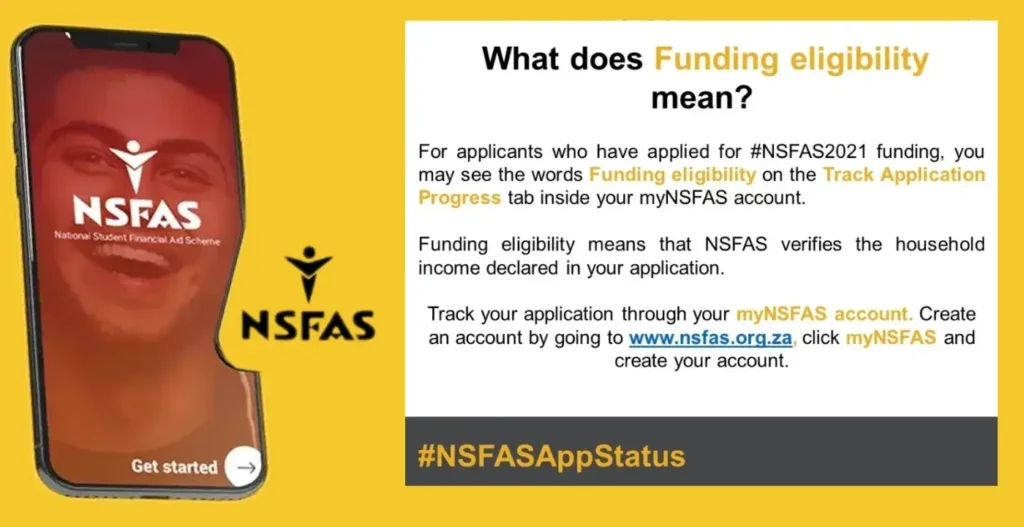NSFAS, which stands for National Student Financial Aid Scheme, is a government-established organization in South Africa dedicated to providing financial support to academically eligible yet economically disadvantaged students pursuing tertiary education.
Table of Contents
Overview of NSFAS
The organization furnishes bursaries to students from low-income and working-class backgrounds, enabling them to access higher education opportunities that might otherwise be beyond their financial reach. Beyond covering tuition fees, NSFAS provides comprehensive support for educational essentials, including accommodation, transportation, meals, books, and learning materials.
Eligibility Requirements For Nsfas Funding

To receive NSFAS funding, applicants must meet these criteria:
- Hold South African citizenship
- Be eligible SASSA grant recipients
- Come from households with a combined annual income not exceeding R350,000
- For students with disabilities, household income must not exceed R600,000 annually
- Students who commenced studies before 2018 must have a household income below R122,000 per year
Historical Background
The South African government established NSFAS in 1991 to create educational opportunities for financially constrained students. Since its inception, the organization has continuously evolved, expanding its reach to support more deserving students throughout the country.
Core Mission
NSFAS aims to uplift and empower students from disadvantaged backgrounds by removing financial barriers to higher education. Through its financial assistance programs, the organization helps transform individual lives while contributing to broader socioeconomic development in South Africa.
Qualification Process
To qualify for NSFAS support, applicants must:
- Be South African citizens or permanent residents
- Be enrolled at a public university or TVET college
- Meet specific income thresholds
The evaluation process considers multiple factors, including:
- Total household income
- Academic performance
- Number of dependents in the family
Application Procedure
Students seeking NSFAS funding must:
- Complete an online application form with accurate personal, academic, and financial information
- Submit supporting documentation, including income verification and identification
- Wait for NSFAS to review and assess their application to determine eligibility and funding level
Financial Support Structure
NSFAS provides financial assistance through:
- Bursaries (non-repayable grants)
- Loans (requiring repayment after graduation)
The funding covers various educational expenses, with allocation amounts determined by:
- Individual financial need
- Program cost
- Available funding resources
Loan Repayment Terms
Students who receive loans must repay them after completing their studies. The repayment structure:
- Is designed to be affordable based on graduate income levels
- Typically includes a grace period before repayments begin
- Contributes to a sustainable funding cycle that benefits future students
Success Stories
NSFAS has empowered countless students to pursue higher education despite financial constraints. Recipients have achieved remarkable academic and professional success, demonstrating the program’s transformative impact on individuals, families, and communities.
Operational Challenges
Despite its significant contributions to educational access, NSFAS faces several challenges:
- Limited funding resources
- Application processing delays
- Administrative complexities
- Efficient fund distribution issues
The organization continuously works to address these challenges and improve service delivery.
Strategic Direction
Looking ahead, NSFAS aims to:
- Enhance financial aid administration
- Streamline operational processes
- Leverage technology for improved efficiency
- Secure sustainable funding sources
- Adapt to evolving student needs and educational landscapes
Common Misconceptions
Myth 1: NSFAS funding requires excellent academic records
Reality: Financial need, not academic performance, is the primary determinant for funding decisions.
Myth 2: Only students from disadvantaged backgrounds qualify
Reality: All qualifying South African citizens and permanent residents can apply.
Myth 3: The application process is complex and time-consuming
Reality: NSFAS provides comprehensive support and guidance throughout the application process.
Covered Expenses
NSFAS funding covers:
- Full tuition fees
- Accommodation (limited to accredited facilities)
- Transportation allowance (capped at a specified amount)
- Required learning materials
Frequently Asked Questions
How do income requirements affect NSFAS eligibility?
Income requirements vary by circumstance, with lower-income families having higher eligibility chances.
Can international students access NSFAS funding?
No, NSFAS funding is exclusively available to South African citizens and permanent residents.
Are NSFAS loans interest-free?
Yes, loans remain interest-free until graduation, after which reasonable interest rates may apply.
What are the consequences of failing to repay an NSFAS loan?
Non-repayment may result in legal action or credit blacklisting, making it essential for graduates to fulfill their repayment obligations.
Does NSFAS fund postgraduate studies?
While primarily focused on undergraduate education, NSFAS offers limited postgraduate funding through specific programs.
Conclusion
NSFAS plays a vital role in democratizing access to higher education in South Africa. Understanding its purpose, eligibility requirements, and application procedures can help students make informed decisions about seeking financial assistance. By carefully following application guidelines, monitoring application status, and seeking guidance when needed, eligible students can secure the necessary funding to pursue their educational aspirations.

